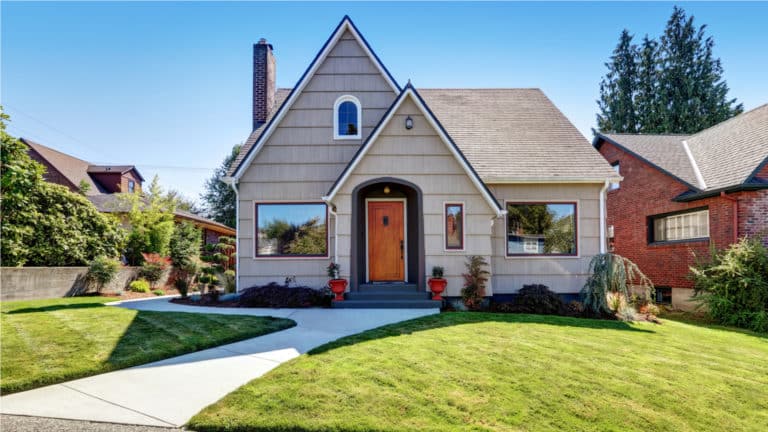Home appraisals are hugely important when it comes to your mortgage. Once a seller has accepted a homebuyer’s offer, a home appraisal is on the short list of final hurdles to clear before closing day.
If you haven’t bought or sold a home before, you may not have ever given home appraisal a second thought. But now that you’re a homebuyer, it’s a good idea to understand how home appraisals work. A home appraisal that falls short of the agreed-upon price for your home can delay your closing day. A significantly low appraisal can even derail your home buying process entirely.
What is a Home Appraisal?
A home appraisal is an independent assessment of the fair market value of the home you’re purchasing.
Mortgage lenders require a home appraisal as a condition of finalizing a mortgage. A mortgage is essentially a loan for a lot of money, after all. Your lender wants to be sure that the home you are buying is is really worth what they’re lending you to pay for it.
(Giving you half a million dollars to buy a home that’s only worth one hundred thousand dollars? That would put your lender in a very tough spot if you suddenly stopped paying your mortgage.)
Home appraisals are conducted by professional state-licensed home appraisers. Exact licensing requirements vary by state. But broadly speaking, home appraisers are well-trained professionals who’ve taken classes, passed tests, and put in the hours to learn how to evaluate homes fairly and accurately.
Lenders arrange for home appraisals, but lenders are aren’t allowed to try to influence appraisers in any way. A home appraiser can’t have any ties to the seller or buyer of the property being appraised.
How Does a Home Appraiser Come Up With a Home’s Value?
A home appraisal has two key parts:
- An in-person assessment of the home itself
- Research into the selling prices of comparable homes
When a home appraiser visits a home, she’ll be looking at all the components of the home that affect value. Think things like lot size, square footage, the number of bedrooms and bathrooms, and how old the home is. A good home appraiser will take detailed notes and measurements. She’ll confirm that the home’s square footage matches the realtor or homeowner’s records. She’ll make note of any condition issues that affect the home’s value or structural integrity. (Unmade beds on appraisal day are totally fine. Water-damaged walls or cracks in a foundation may not be.)
A home appraiser will also do some research on the state of your local real estate market. She or he will look at the recent selling prices for other homes in your area. Then, she’ll compare similar, recently-sold homes to the home she’s appraising. A home appraiser will pay attention to the ways in which the home she’s appraising differs from the rest of the homes in its area. Does this home have a two-car garage in a neighborhood where most homes have a single-car garage? Is it on a corner? Does it have obstructed views? is the yard unusually large or small? Do other nearby homes have mature trees or swimming pools?
How is a Home Appraisal Different from a Home Inspection?
Remember: all your lender wants to know is how much money they could expect to get for the home if they had to sell it after a foreclosure.
Home appraisers are experts at coming up with a number for the market value of your home. That means home appraisers know enough about HVAC systems, roofing, plumbing, and other major home systems to understand how those systems affect home values. They can assess damage that impacts the value of the home for sale.
But home appraisers aren’t expert plumbers or master electricians or roofing professionals. They can usually spot major home repair concerns. But they won’t be able to give you an assessment of how to fix any issues they find. Nor can they tell you what it would cost to do so. And it’s easy for home appraisers to miss hidden condition issues.
Think of it this way: your mortgage lender wants to know that the furnace works. It is tougher to sell a house without a working furnace. As long as the furnaces is in good working order, your lender isn’t especially interested in whether that furnace will need be replaced in the next five years, or if it should last the next twenty years. As a homebuyer, though, that’s information you’d probably like to know.
Who Pays for the Home Appraisal?
Generally, a home’s seller will pay for the appraisal. The cost of a home appraisal varies depending on local market conditions and the complexity of the job. A 1500-square foot single family dwelling in a suburban development will probably cost less to appraise than a 40-unit apartment building with retail space on the ground floor in a dense urban environment.
Of course, if you’re refinancing your current mortgage, there is no outside ‘seller’. If you’re refinancing a small amount that’s very clearly less than the value of your home, or if you’re refinancing very soon after your initial mortgage, your lender may waive the home appraisal. But if your lender does require an appraisal as a condition of approving your refinance mortgage? Then you’ll probably be footing the bill for the appraisal yourself. You can expect the cost of the appraisal to appear in your closing costs.
Should I Worry About the Home Appraisal?
Most of the time, home appraisal values will match or be slightly higher than the selling price on which the homebuyer and seller have agreed. (A good real estate agent can help you make a fair offer for what the home is worth or just under what the home is worth.)
But sometimes, homes appraise for less than the agreed-upon offer price.
Low appraisals sometimes happen in real estate markets that are rapidly heating up. Low appraisals can also happen in areas with few comparable homes. If sales happen infrequently in a community, say, or if the home being purchased is much nicer or much more modest than the homes surrounding it.
In any case, a low home appraisal is a big deal for one big reason. Your mortgage lender will almost certainly not lend you more money to buy a home than an independent home appraiser thinks your home is worth. Usually, a lender will lower the mortgage amount to match the appraised value. And that would leave you a gap between what you can borrow to buy the home, and what you’ve agreed to pay for it.
What Happens If the Appraisal Amount is Less Than the Selling Price?
If your appraisal comes in low, you’ve got a few options.
Most lenders have an appeal process. To appeal a low appraisal, you’ll want to have compelling evidence for why you think the initial appraisal was unfair or inaccurate.
You may be able to ask the seller to reduce the price to match or come closer to the appraised value. (Hopefully, your offer included a contingency that the home needed to appraise at or over the offer price, giving you the option to walk away from the deal.)
As a last ditch effort, if you really want the property and you yourself are prepared to pay more than a professional thinks the place is worth, you could potentially put in a larger down payment to cover the difference.






